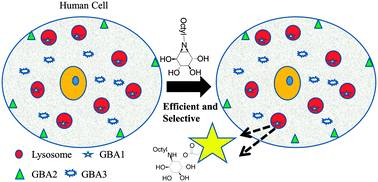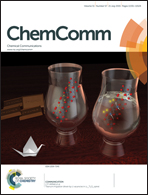N-Alkylated aziridines are easily-prepared, potent, specific and cell-permeable covalent inhibitors of human β-glucocerebrosidase†
Abstract
β-Glucocerebrosidase deficiency leads to Gaucher disease and is a potential marker of Parkinson's disease. We have identified N-octyl conduritol aziridine as a potent and specific covalent inactivator of GBA1 in living cells. This compound is a promising lead towards a positron emission tomography probe intended to image GBA1 activity.


 Please wait while we load your content...
Please wait while we load your content...